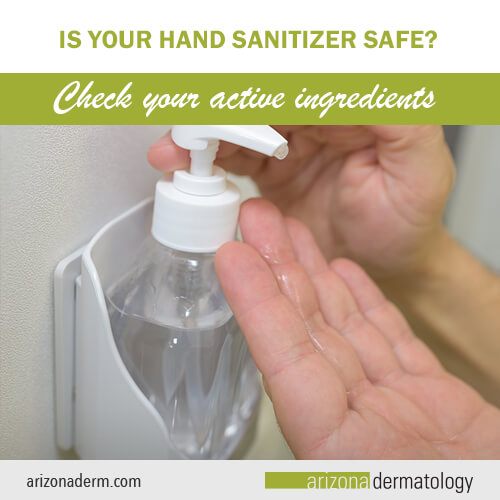 As we continue to feel the effects of Covid-19, it is important to follow Center for Disease Control (CDC) recommendations for minimizing your risk, including wearing a mask, avoiding crowds, washing your hands often, and using an appropriate hand sanitizer when you are unable to wash your hands with soap and water. But not all hand sanitizers are alike. Some have been found to contain toxic ingredients that put you and your family at risk. Here’s what you need to know about hand sanitizer safety from a dermatologist’s perspective.
As we continue to feel the effects of Covid-19, it is important to follow Center for Disease Control (CDC) recommendations for minimizing your risk, including wearing a mask, avoiding crowds, washing your hands often, and using an appropriate hand sanitizer when you are unable to wash your hands with soap and water. But not all hand sanitizers are alike. Some have been found to contain toxic ingredients that put you and your family at risk. Here’s what you need to know about hand sanitizer safety from a dermatologist’s perspective.
Check your active ingredients
No hand sanitizer ingredient is proven to prevent or treat infection by Covid-19. The CDC continues to maintain that washing your hands with plain soap and water for at least 20 seconds is preferable, but when this is not an option, certain hand sanitizers can be a viable alternative. Alcohol-based hand sanitizers that contain at least 60% ethanol (also referred to as ethyl alcohol) are believed to be the most effective options against Covid-19. Other active ingredients that are legally marketed are isopropyl alcohol (also referred to as 2-propanol or rubbing alcohol) and benzalkonium chloride. Again, because hand sanitizer does not provide guaranteed protection, you should wash your hands properly as soon as possible. If your skin is suffering because of this, this blog post can help.
Beware of the hidden, toxic ingredients methanol or 1-propanol
Since the development of the Covid-19 pandemic, the FDA has discovered that certain brands of hand sanitizer with “ethanol” listed as an ingredient have tested positive for methanol, also known as wood alcohol. Methanol is toxic when absorbed through the skin or ingested and can be deadly when ingested. Exposure can result in nausea, vomiting, blurred vision, headache, seizures, permanent blindness, coma, permanent damage to the nervous system or death. The greatest risk is for small children ingesting methanol-containing sanitizers or teens and adults ingesting methanol-containing sanitizers as an alternative to alcohol.
Most recently, another dangerous hidden ingredient has been found in certain hand sanitizers: 1-propanol. An August 12th, 2020, an update from the FDA warned of hand sanitizer products manufactured by Harmonic Nature S de RL de MI in Mexico that are labeled to contain ethanol or isopropyl alcohol but have tested positive for 1-propanol contamination. 1-propanol can be toxic and life-threatening when ingested, causing central nervous system depression, which can result in death.
If your child ingests any form of hand sanitizer, call poison control or a medical professional immediately.
If you believe you are experiencing symptoms related to methanol exposure or 1-propanol ingestion, seek medical attention immediately.
Because you won’t see “methanol” or “1-propanol” listed on the label, you’ll need to check your personal hand sanitizer products against the FDA’s updated list of unapproved hand sanitizers. This list also contains products that aren’t dangerous, but simply don’t meet the FDA’s standards for effectiveness.
If you believe you have experienced or witnessed adverse effects from exposure to hand sanitizer, you are encouraged to report it here.
Homemade hand sanitizers
While it may be tempting to make your own hand sanitizer, we do not recommend it and neither does the FDA. Homemade hand sanitizers made incorrectly can, at best, be ineffective, and, at worst, cause skin burns. Adding rubbing alcohol to a commercial non-alcohol-based hand sanitizer is also likely to be ineffective. Also, do not use cleaning products designed for surfaces on your skin! Disinfectant liquids, sprays and wipes can cause skin and eye irritation and are meant for non-porous surfaces and especially not for the porous skin of the human body.
Expiration dates and shelf stability
Commercial hand sanitizers are required to have an expiration date unless they have been proven stable for more than three years. This, however, does not apply to products manufactured specifically for the Covid-19 public health crisis, as they are expected to be used quickly. With the shortage of hand sanitizers recently experienced and the overall push to make more, it is unlikely that any hand sanitizer you have purchased in the last couple of months will be expired.
If you are storing hand sanitizer, keep it on a shelf out of reach of small children and under temperatures of 105 degrees Fahrenheit (i.e. don’t store it in a hot garage or keep it in your car).
Disposing of unsafe hand sanitizer products
If you discover one of your hand sanitizers is on the warning list for potential methanol or 1-propanol contamination, dispose of it immediately in a hazardous waste container or contact the hazardous waste department of your local waste management center. Do not dump the product, flush it, or pour it down a drain as this releases the toxic ingredients into the environment and water supply.
For more information on the FDA’s ongoing oversight of hand sanitizers and responses to Covid-19, visit www.fda.gov.


